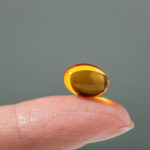By David Blyweiss, M.D., Advanced Natural Wellness
April 27, 2012
Article 3 of 3 in Series
- Can a lifetime of mercury exposure give you Alzheimer’s?
- Why your immune system matters more than ever
- To your brain, stress and Alzheimer’s looks the same
Protecting yourself against Alzheimer’s can feel a little like hiding from the boogeyman. You can’t see it, don’t know where it’s hiding, or when it’s going to pop out and scare you.
That’s what makes the last three risk factors we’ll discuss today that much more important.
Each of them has a cumulative effect on the body, wearing it down. And a worn-down body is much more susceptible to disease than a strong, healthy body.
Especially as you age…
For a while, aluminum pots – which most of us grew up with – were top on the list as a cause of Alzheimer’s. While research did away with that theory, mercury is still suspect.
Open your arteries, improve blood flow for a new health miracle...
Did you know your circulatory system has over 60,000 miles of arteries, veins and other blood vessels, if stretched end to end?
But as you age, your blood vessels undergo changes, which may cause them to stiffen, thicken and get clogged.
GOOD NEWS! Doctors have now identified a “Miracle Molecule” inside your arteries that helps OPEN your arteries and IMPROVE blood flow.
It’s what Dr. Valentin Fuster calls it, "One of the most important discoveries in the history of cardiovascular medicine."To you, that means...
- Healthy blood pressure
- Sharper mind and memory
- Skyrocketing energy and muscular strength
- Increased pleasure and passion in the bedroom
- Improved circulation to every cell and organ in your body
Go here to discover a new natural way to significantly boost the levels of this miracle molecule in YOUR body NOW!
Of course, mercury toxicity is a controversial issue. Mercury is still being used in dental fillings, despite many warnings against the practice. And mercury continues to be used as a preservative in vaccines. Plus, mercury is present in fish at higher levels than ever before.
The problem is that many of us have been stocking away mercury in our bodies for years. And some of us more than others. Depending on how many fillings you have, or whether you get a flu shot every year, or how much tuna or salmon or swordfish you eat.
Your levels can also be affected by how your body moves mercury out, which can be genetic depending on how well you make glutathione. There are plenty of factors that determine your mercury levels. And a very real possibility that your levels could be quite high… without you knowing it.
Whether it’s ultimately a cause or a contributing factor of Alzheimer’s, I strongly recommend you get the mercury out of your body. You can start by adding a few ingredients to your diet for starters. Both chlorella and cilantro remove mercury from your system. Incorporating those regularly into your diet will slightly lower your levels.
And if you can increase your body’s production of glutathione, your body can do its own dirty work of removing toxins.
Glutathione is a powerful antioxidant, and one of the body’s main detoxifying agents – which is why it’s found in such high concentrations in the liver. To stimulate your production of glutathione, increase your intake of the amino acids alpha-lipoic acid (ALA), 100 mgm twice a day and n-acetyl cysteine (NAC) 600 mgm twice a day. These are considered effective low doses. Some people can and do take slightly higher doses of both.
Last but not least, you can remove mercury through in-office chelation. Chelation is the process of removing metals and toxins from the body, safely and slowly. To go this route, you need to find an experienced physician who practices chelation.
Are You Suffering From...
- Love handles and a pot belly
- Romance that isn't what it used to
- Forgetfulness and inattention
- Low (or no) strength and endurance
- A sex drive that's shifted into neutral...or worse
If so...you may have Mature Male Burnout. Click here to discover more about this unique condition and what you can do about it.
Note: before you receive a methylcobalamin B12 shot, be sure to tell your doctor you are chelating for mercury, as these two done together may re-methylate any circulating mercury and make you feel tired for a short time. In this instance cyano or hydroxocobalamin should be used.
The second X factor that can help reduce your Alzheimer’s risk is to boost your immune system.
One theory about why age makes you more susceptible to Alzheimer’s is that your immune system weakens as you get older. This gap in protection allows the other factors to kick in and take over.
You see, almost every disease has these two elements at work: the presence of the cause of the disease, and the host’s receptivity to it.
In other words, even if you have all the other factors – the Alzheimer’s gene, the presence of HSV1 in your system, mercury toxicity – a strong immune system still might grant you protection.
But a weakened immune system is like giving the security guard of your brain time off during the busy season.
So as you get older, and your risk for the onset of Alzheimer’s gets higher, it’s critically important to consistently eat right, get enough sleep, and maintain high levels of vitamin D and antioxidants.
And finally, the last X factor…
If you’re prone to chronic stress, and you have any of the other factors I’ve discussed in this series, you’re adding fuel to the fire.
Stress plays a role in the frequency of outbreaks of the herpes virus. It downgrades the immune system, which acts like the guardian to your brain.
Worse, it can create some of the same changes in the brain as Alzheimer’s. Researchers are now looking at stress as the possible trigger initiating the disease process if all the other factors are in place.
Stress is something you can’t afford to have in your life. If you don’t already, begin mind and body exercises that can relieve your stress. And make any other changes to your lifestyle that would reduce your stress levels.
I often recommend that my patients do deep diaphragmatic belly breathing several times a day. This is as simple as taking a deep breath to the count of four, holding it for the count of five, and then slowly exhaling to the count of six.
Popular practices such as yoga, tai chi and meditation are all stress-busters. Listening to music, taking a bath, getting regular massage – all of these provide the body with a much-needed break from producing cortisol. Your brain will ultimately thank you.
This complicated matrix of conditions that can eventually add up to Alzheimer’s is an evolving picture. One that I’m sure will change and come into increasingly clearer focus in the years ahead.
I will continue to bring you updates, changes and recommendations as new research is completed.
Resources:
Mutter J, Naumann J, Schneider R, Walach H., Mercury and Alzheimer’s disease, Fortschr Neurol Psychiatr. 2007 Sep;75(9):528-38. Epub 2007 Jul 12. [Article in German]
Ioannis Sotiropoulos, et. al., Stress Acts Cumulatively to Precipitate Alzheimer’s Disease-Like Tau Pathology and Cognitive Deficits, Journal of Neuroscience, May 25, 2011; 31(21):7840-7847






